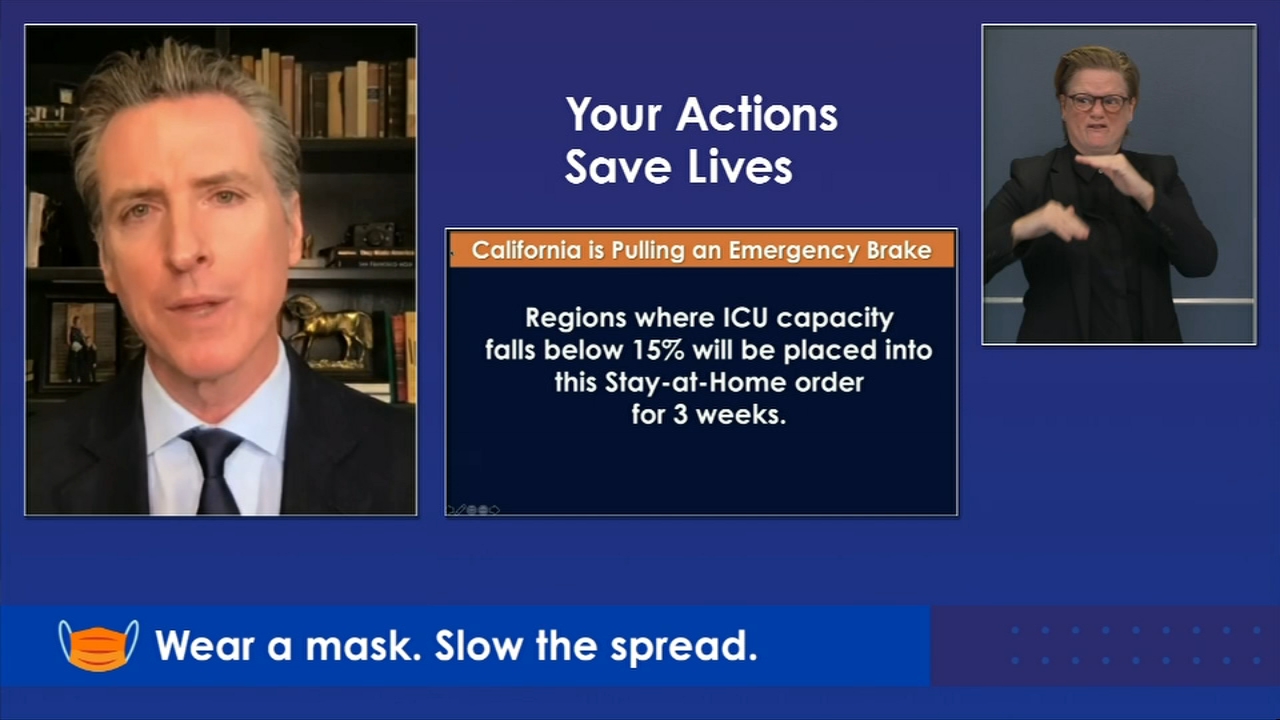Stay home order: All of SoCal under new restrictions as COVID cases fill hospital beds

LOS ANGELES (KABC) -- As California hospitals struggle with an influx of mounting COVID-19 cases, state officials imposed a new "stay home" order on more than 33 million people.
The new rules took effect just before midnight Sunday for Southern California and a large swath of the Central Valley. The rules were triggered when available capacity in the region's intensive care units fell below 15%.
The stay-at-home order will be in place for at least three weeks and prohibits gatherings of people from different households. Regions will be eligible to exit from the order on Dec. 28 if ICU capacity projections for the following month are above or equal to 15%.

Gov. Gavin Newsom announced the statewide order last Thursday as part of his latest effort to also keep people from gathering with others from outside their households.
The order divides the state into five regions and connects business shutdowns and travel restrictions to hospital ICU capacity. When a region has fewer than 15% of its ICU beds available, new restrictions are imposed.
The statewide order took effect at 12:59 p.m. Saturday, after which regions had 24 hours to implement the rules. The rules don't apply to public schools with in-person learning.
The Southland's intensive care unit capacity dropped below the 15% threshold on Friday, to 13.1%. That number fell even further on Saturday, to 12.5%, according to the California Department of Public Health. The ICU capacity Sunday for the region was 10.3%.
"The bottom line is if we don't act now our hospital system will be overwhelmed," Newsom said. "This is the most challenging moment since the beginning of this pandemic."
The Southern California region consists of 11 counties, including Los Angeles, Orange, Riverside, San Bernardino, Ventura and San Diego.
According to the governor's office, the triggering of the regional stay-home order mandates that the following activities and sectors must close:
- Indoor and outdoor playgrounds
- Indoor recreational facilities
- Hair salons and barbershops
- Personal care services
- Museums, zoos, and aquariums
- Movie theaters
- Wineries
- Bars, breweries and distilleries
- Family entertainment centers
- Cardrooms and satellite wagering
- Limited services
- Live audience sports
- Amusement parks
Other sectors that will be allowed to stay open when operating remotely is not possible include:
- Critical Infrastructure
- Schools that are already open for in-person learning
- Non-urgent medical and dental care
- Child care and pre-K
Much of the state is on the brink of the same restrictions. Some counties have opted to impose them even before the mandate kicks in, including five San Francisco Bay Area counties where the measures also take effect starting Sunday.
Some local law enforcement said they would not enforce the rules. Others say they are educating the public and will issue citations only if necessary.

STAY-AT-HOME ORDER
- Hair salons: closed
- Retail: open indoors at 20% capacity
- Malls: open indoors at 20% capacity and limited food courts
- Nail salons: closed
- Electrolysis: medical offices open indoors with modifications
- Personal care services (body waxing, etc.): closed
- Tattooing and piercing: closed
- Museums, zoos and aquariums: closed
- Places of worship: outdoor only
- Movie theaters: closed
- Hotels: open only for essential travelers
- Gyms: closed
- Restaurants: open for takeout and delivery only
- Wineries: closed
- Bars and breweries: closed
- Family entertainment centers: closed
- Cardrooms: closed
- Non-essential offices: remote work only
- Professional sports: no live audiences
- Schools: can stay open if they received a waiver to open for in-person instruction before stay-at-home order
- Theme parks: must stay closed
The Associated Press and City News Service contributed to this report.










